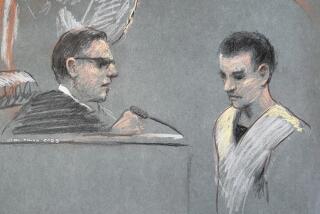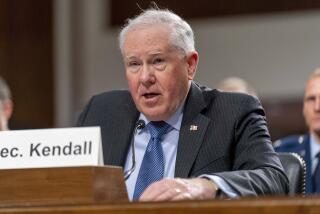Whistle-Blower’s Security Clearance Threatened
- Share via
WASHINGTON — The Air Force has told whistle-blower A. Ernest Fitzgerald that he will lose his security clearance and right to work with a congressional oversight panel if he does not sign a new secrecy agreement within 30 days.
That could end the whistle-blowing activities of Fitzgerald, 60, who rose to national prominence in 1969, when he disclosed cost overruns in the C-5A cargo plane and was fired. He was reinstated under a court order in 1982.
Showdown Possible
It could also force a showdown between the Pentagon and members of Congress who have protested the new secrecy agreement. Critics say that it would have a “chilling effect” on whistle-blowers by allowing the government to classify material after it had been disclosed to lawmakers or the public and to punish an offender without appeal.
Although he remains on the Air Force payroll, Fitzgerald has refused since last December to sign the Reagan Administration’s new “Classified Information Nondisclosure Form 189,” which he describes as “a gag order.”
Lt. Gen. Claudius E. Watts III, the Air Force comptroller, informed Fitzgerald in a letter delivered Thursday that failure to sign the new form “within 30 days will result in suspension of your access to classified information and continuation of procedures leading to revocation of your security clearance.”
The court order reinstating Fitzgerald to his job as Air Force “management systems deputy” in 1982 specified that the job “requires access to top secret information.”
“I already have a security clearance, and I haven’t done anything to warrant its removal,” Fitzgerald said in an interview Friday.
Air Force spokesman Col. Peter Sloan said “it remains to be seen” whether Fitzgerald will be able to keep his Pentagon job if he loses his security clearance. Last month, the Air Force said that 1.5 million federal employees had signed the secrecy agreement since 1985.
Works for Panel
In a separate letter, Watts said he was revoking an agreement reached in 1985 by then-Air Force Secretary Verne Orr and Rep. John D. Dingell (D-Mich.) allowing Fitzgerald to work unhindered with Dingell’s House Energy and Commerce subcommittee on oversight and investigations.
Fitzgerald said the second letter appeared aimed at hampering Dingell’s investigations into such programs as the Army’s Bradley armored personnel carrier and the Air Force’s stealth bomber and MX missile.
More to Read
Sign up for Essential California
The most important California stories and recommendations in your inbox every morning.
You may occasionally receive promotional content from the Los Angeles Times.












